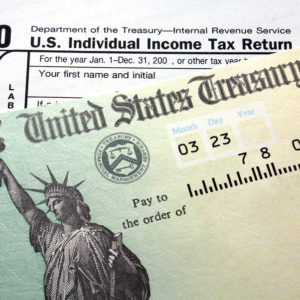For the present pandemic-induced economic crisis, the Federal Reserve is not enough.
While the Federal Reserve can under “unusual and exigent circumstances” create emergency lending programs to help corporations unable to secure adequate credit accommodations from other banking institutions, this Fed power is not directly helpful if you are a cash-short citizen.
The federal government in the form of the U.S. Treasury is the only institution capable of stepping in to help, and it can do it quickly and without blowing a hole in the federal budget if it takes a new, creative approach for using federal income tax refunds.
There are soon to be thousands of workers in the restaurant, airline, hotel, sports venue and other hospitality industries who are furloughed for weeks if not longer. When these people stop spending, jobs losses will quickly mount in other industries.
For most people, no work means no paycheck. With no paycheck, a payroll tax reduction will not put a single penny in your pocket. New federal government mandates that require employers to provide employees with new additional paid sick leave may appeal to you unless you are an employer already suffering from the crisis and these new expenses make your situation even worse. Employers did not cause the Covid-19 crisis.
Congress could vote to send a check for thousands of dollars to millions of taxpayers as some have suggested, but this would add a substantial amount to the federal debt when the U.S. debt-to-GDP ratio is nearing levels not seen since World War II. It is in everyone’s interest to take the measures necessary to stop the spread on the coronavirus, and everyone should share the costs necessary to ensure this happens.
One way to quickly alleviate the economic fallout from the coronavirus crisis without increasing the budget deficit is to send all tax-filing households a pre-paid tax refund immediately. The pre-paid refund should be identical for every tax-filing household. The magnitude can be fine-tuned, but for arguments sake, call it $5,000 — an amount roughly equal to twice the average tax refund in 2018.
Once the economy recovers, say in two years, future taxpayer refunds will be used to repay the $5,000 over the course of a few years. Taxpayers that do not normally receive refunds but still receive the $5,000 prepayment would face tax surcharges over the next few years to repay advanced funds.
A pre-paid tax refund is nothing more than an interest-free loan from the federal government. The federal government becomes the lender-of-last-resort for its regular citizens. When the time for repayment arrives, if the economy has recovered, as it likely will, repayment will be simple. If the economy has not recovered, Congress can turn this interest-free loan into a tax cut by changing repayment obligations.
These prepaid tax refunds will have substantial benefits for all taxpayers as households are provided interest-free loans that can be used to bridge the temporary costs of battling the coronavirus.
To avoid political squabbles, I recommend that uniform tax refund checks be sent to all tax filers without any specific income restrictions except for adjusting refunds for taxpaying married couples filing separately so taxpaying households receive equal stimulus checks.
Some taxpayers who do not need temporary stimulus relief will get refunds, but this is not a giveaway — these taxpayers will have to repay these refunds. It is likely that these refunds will be invested until tax repayments are due, creating investment inflows that could help to stabilize financial markets — a stimulus similar to Federal Reserve recently announced quantitative-easing, but without the Federal Reserve choosing which investments to purchase.
If the prepaid refunds are accounted for like federal government loans, as they in substance are, they will have minimal effect on the current budget deficit because the government receives an asset (deferred tax payments) to offset its cash outlay. If the loans are repaid within10 years, they have no effect on the Congressional Budget Office 10-year deficit projection. Moreover, the federal government is in a strong position to ensure that prepaid refunds are ultimately repaid.
The true cost of temporarily advancing tax refunds is minimal because the government is borrowing at near-zero interest rates and will recoup the stimulus expenditures when the economy recovers from the virus-induced recession. This stimulus program does not change the magnitude of income taxes, only the timing of tax payments, and it will provide cash-short citizens and the overall economy with an immediate and badly needed stimulus.

